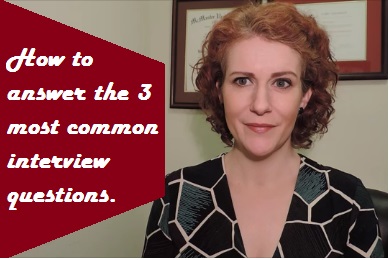Preparing for your job interview can seem overwhelming. You spend hours preparing only to walk in to the interview to face a series of questions for which you hope you have the right answer. In the video attached, I will discuss the three most common interview questions:
- Tell me about yourself.
- What is your greatest weakness?
- Tell me about a time when….
Tell me about yourself.
First, the “tell me about yourself” question is typically used as an ice-breaker. It seems to be a straight-forward question, but bear in mind that your answer can either reinforce or destroy the interviewers’ first impression of you. This could be good or bad – depending on how good a first impression you make and how well you answer this question. Your answer should be short and relevant, answering the question, why should we hire you. Bottom line: this is where you use your elevator pitch. If you don’t have an elevator pitch prepared, or if you don’t know how to write one, here are some articles I would recommend you read:
A really great book to help with your interview is in the What Colour is Your Parachute series:
What is your greatest weakness?
Second, the “What is your greatest weakness?” question is probably the most over-thought interview question. The interviewer is really looking to see how self-aware, committed to self-improvement, and how able to overcome obstacles you are. Answers to avoid include: I am a perfectionist; I am an over-achiever; or I am a workaholic. These responses are over used and seem insincere. Instead, think of an actual area that you are trying to develop. Identify the strategies you are using to develop, and what improvements you have seen to date. An example can be found in the video.
Tell me about a time when….
Finally, the ever so popular “Tell me about a time when…” question seems to strike fear in the hearts of even the most seasoned interviewers. The use of this question is based on the theory that the best predictor of future behaviour is past behaviour. Here is where you would insert your “war stories” (“War Stories” were discussed in my previous video, which you can find here) and format your response using the STAR format: Situation, Task, Action, and Result. An example of this can be found in the video.
In summary, part of being prepared for your interview is practicing. Anticipating these questions, preparing your answer, and practicing your response should drastically reduce your interview anxiety. As a result, your performance will skyrocket!
There is a bonus blooper reel at the end of the video, so watch ‘til the end!


